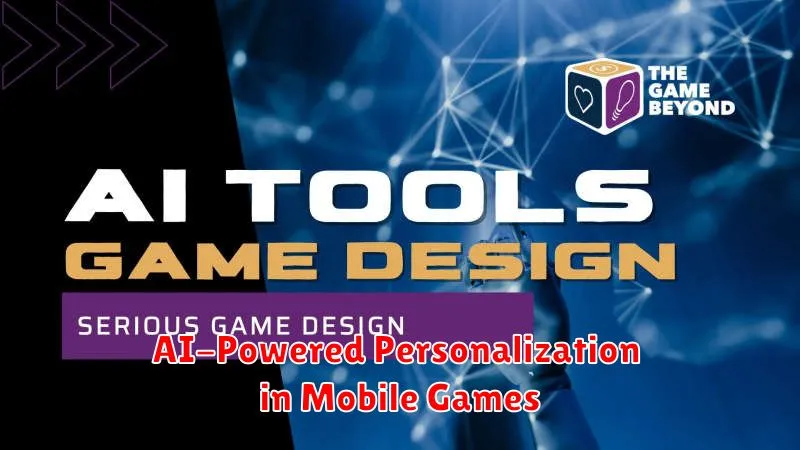The world of mobile gaming is undergoing a dramatic transformation, driven by the relentless advancements in artificial intelligence (AI). From personalized gaming experiences to innovative game design, AI is revolutionizing the way we play and interact with mobile games. This article delves into the fascinating future of mobile gaming, exploring how AI is reshaping the industry and creating unprecedented opportunities for both developers and players.
AI is no longer a futuristic concept; it’s a powerful tool that is actively shaping the mobile gaming landscape. From intelligent opponents and adaptive difficulty levels to immersive storytelling and personalized recommendations, AI is enhancing every aspect of the gaming experience. As AI technologies continue to evolve, we can expect even more transformative changes in the future, pushing the boundaries of what’s possible in mobile gaming.
AI-Powered Personalization in Mobile Games

AI is revolutionizing mobile gaming by enabling personalized experiences that cater to each player’s unique preferences. This level of personalization is achieved through sophisticated algorithms that analyze player data, including gameplay patterns, in-app purchases, and even social interactions.
AI-powered personalization manifests in various ways:
- Tailored Difficulty Levels: AI adjusts the game’s difficulty to match a player’s skill level, preventing frustration and encouraging continued engagement.
- Targeted Content: AI recommends specific content, such as quests, items, and events, that align with a player’s interests and progress.
- Personalized Storytelling: AI dynamically modifies the game’s narrative based on player choices, creating a truly unique and engaging experience for each individual.
- Dynamic In-Game Events: AI can dynamically adjust in-game events to suit player preferences, creating a more exciting and engaging experience.
The benefits of AI-powered personalization in mobile games are significant:
- Increased Player Engagement: Personalized experiences keep players hooked by providing them with relevant and enjoyable content.
- Improved Player Retention: By creating tailored experiences, AI helps retain players for longer periods, leading to a more sustainable player base.
- Enhanced Monetization: AI-driven personalization allows developers to target specific player segments with relevant in-app purchase offers, resulting in improved monetization.
As AI continues to evolve, its impact on mobile gaming will only intensify. The future holds even more sophisticated personalization techniques, transforming the way we play and experience mobile games.
The Rise of AI in Mobile Game Development
The gaming landscape is rapidly evolving, and one of the most significant driving forces behind this transformation is the rise of artificial intelligence (AI). AI is no longer confined to science fiction; it is actively shaping the future of mobile gaming, bringing about a new era of immersive, intelligent, and personalized experiences.
AI is revolutionizing mobile game development in several key ways. One of the most notable impacts is in the creation of non-player characters (NPCs). With AI, NPCs can become more dynamic, engaging, and believable. They can react to player actions in real-time, learn from their interactions, and adapt their behavior over time. This level of sophistication elevates the player’s immersion and makes the game world feel more alive.
Another significant area where AI is making its mark is in game design and development. AI algorithms can analyze vast amounts of data about player behavior, preferences, and gameplay patterns. This data can then be used to optimize game mechanics, balance difficulty levels, and even suggest new content based on player interests.
The impact of AI extends beyond the game itself; it also enhances the player experience. AI-powered chatbots can provide players with personalized support, answer questions, and even guide them through complex gameplay elements. AI can also be used to personalize game recommendations, ensuring that players are exposed to games that align with their interests and play styles.
As AI technology continues to advance, its role in mobile game development will only become more prominent. We can expect to see even more sophisticated and immersive experiences, powered by intelligent algorithms that learn, adapt, and create personalized gameplay that keeps players engaged and entertained. The future of mobile gaming is one where AI plays a vital role, pushing the boundaries of what’s possible and shaping the way we interact with and experience games.
How AI Enhances Gameplay Experience
Artificial intelligence (AI) is transforming the mobile gaming landscape, revolutionizing gameplay experiences and creating a more immersive and engaging world for players. AI-powered game design is pushing the boundaries of what is possible, making games more challenging, adaptive, and personalized.
One of the most significant ways AI is enhancing gameplay is through the development of intelligent non-player characters (NPCs). AI-powered NPCs behave more realistically, exhibiting complex emotions, motivations, and responses. This dynamic interaction creates a more immersive and engaging world for players to explore.
Another way AI is enhancing gameplay is by creating dynamic and adaptive challenges. AI can analyze player behavior and adjust the difficulty level on the fly, ensuring a challenging and enjoyable experience for all skill levels. This allows for a truly personalized experience where players can face unique challenges tailored to their abilities.
Furthermore, AI is enabling personalized recommendations and content within games. By analyzing player preferences, AI can suggest relevant missions, items, and other content that aligns with their interests. This helps players discover new aspects of the game and maximizes their enjoyment.
In conclusion, AI is driving a new era in mobile gaming by enhancing gameplay experience in several ways. From intelligent NPCs to personalized content, AI is creating a more immersive, challenging, and engaging world for players. As AI continues to evolve, the future of mobile gaming promises even more innovative and exciting experiences.
Challenges in Implementing AI in Mobile Gaming
While AI presents a plethora of possibilities for revolutionizing mobile gaming, there are significant challenges in its implementation. One of the most pressing concerns is device limitations. Mobile devices often have less processing power and memory compared to PCs or consoles, making it challenging to run complex AI algorithms smoothly. This can lead to lag, performance issues, and a subpar user experience.
Another challenge lies in balancing realism and player engagement. AI-powered opponents should be challenging yet not frustratingly difficult. Finding the right sweet spot can be tricky, especially when considering a diverse range of player skill levels. Moreover, AI-driven game mechanics must be transparent and understandable to players. If the AI’s decision-making process appears arbitrary or opaque, it can undermine player trust and enjoyment.
Furthermore, data privacy and security are paramount. Mobile games collect extensive user data, and leveraging this information for AI purposes necessitates careful consideration of ethical implications and compliance with data protection regulations. Ensuring that AI algorithms are developed and used responsibly is essential to maintaining player trust and fostering a positive gaming environment.
Finally, developer resources and expertise are crucial. Implementing AI effectively requires specialized knowledge and skills that may not be readily available within every game development team. The learning curve can be steep, and dedicated resources are needed for research, development, and ongoing maintenance.
Future Trends in AI-Powered Mobile Games

Artificial intelligence (AI) is rapidly transforming the mobile gaming landscape. AI-powered mobile games are already delivering more personalized and immersive experiences for players, and this trend is only going to accelerate in the coming years.
One of the most significant future trends in AI-powered mobile games is the rise of procedural content generation. This technology uses AI to create unique levels, missions, and even entire game worlds, ensuring a fresh and engaging experience every time a player interacts with the game. This can lead to near endless replayability as the AI can craft new and exciting experiences. This trend will be particularly impactful in games with open worlds or procedurally generated content.
Another exciting trend is the increasing use of AI for non-player characters (NPCs). AI-powered NPCs will become more realistic, interactive, and engaging, blurring the line between virtual and real-world characters. The ability to adapt to player behavior and offer realistic responses will create more immersive experiences. This will be a major trend in games focused on narrative, roleplaying, and social interaction.
AI is also being used to enhance the user experience in mobile games in a variety of ways, from personalized game recommendations to dynamic difficulty adjustments. AI can analyze player data to tailor the difficulty level of the game to their skill level, leading to a more enjoyable experience for both casual and hardcore gamers. This will be a trend across all types of mobile games, creating a more tailored experience for each individual.
With the rapid advancement of AI technology, the future of mobile gaming looks incredibly bright. AI will continue to transform the way we play and experience games, making them more personalized, immersive, and engaging than ever before. The trends outlined above will lead to a future of mobile games that are more dynamic, challenging, and ultimately more fun for all players.
Case Studies: Successful AI-Driven Mobile Games
Artificial intelligence (AI) is rapidly transforming the gaming industry, and mobile gaming is no exception. AI-powered features are enhancing gameplay, increasing engagement, and driving user satisfaction. Let’s explore some successful case studies of AI-driven mobile games:
1. “Clash of Clans” by Supercell: This popular strategy game uses AI to create challenging and engaging gameplay. The game’s AI opponents are highly sophisticated and adapt to players’ strategies, providing a constantly evolving challenge. The AI also assists in balancing the game, ensuring fairness and preventing players from becoming overpowered.
2. “Mario Kart Tour” by Nintendo: This mobile racing game utilizes AI to create personalized racing experiences. The game’s AI opponents adjust their difficulty based on the player’s skill level, ensuring a competitive yet enjoyable experience for everyone. The AI also powers the game’s “rubber banding” mechanic, which keeps players close in the race, increasing excitement and engagement.
3. “Pokémon GO” by Niantic: This location-based augmented reality game utilizes AI for various purposes. The AI helps determine the spawn locations of Pokémon, ensuring that players encounter different creatures in different areas. It also powers the game’s Gym battles, providing challenging opponents for players to test their skills against.
These are just a few examples of how AI is shaping the future of mobile gaming. By leveraging AI’s power, developers can create more immersive, challenging, and personalized gaming experiences for players worldwide. As AI technology continues to advance, we can expect even more innovative and exciting uses of AI in mobile games in the years to come.

